Hiki Review
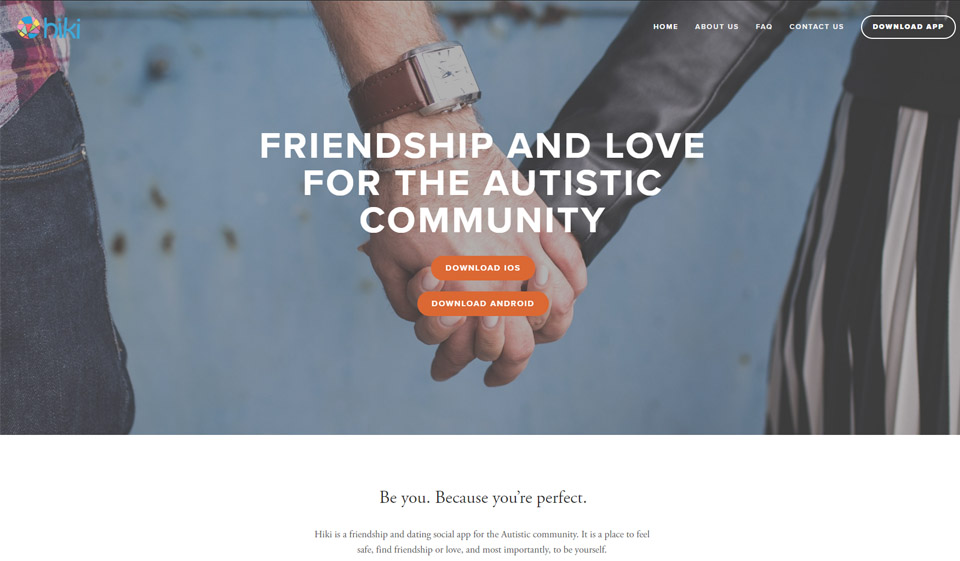
| Active Audience | 72% |
| Quality Matches | 89% |
| Popular Age | 24-25 |
| Profiles | 2 100 000 |
| Reply Rate | 87% |
| Ease of Use | 6.3 |
| Popularity | 9.2 |
| Fraud | Very Rarely |
| Rating |
9.8
|
| Registration | Free |
-
Euan Barker
-
08 Sep 2020Updated:31 Dec 2025
-
3882 Views
-
11 min read
Pros and Cons
- Hiki has a mobile app for Android and Apple users;
- A niche dating site for people with autism;
- A friendly community;
- Pleasant design;
- Smooth transitions inside the app.
- This service doesn’t have a full-fledged site;
- There a lot of bad reviews;
- The match preferences are a few;
- The rating is low.

Looking for a Sugar Daddy site?
Take a quiz and find the perfect one!
Hiki is a dating site aimed at connecting people who have autism. Its name comes from the Hawaiian word meaning “able” and briefly explains the main idea of this resource. The founders wanted to prove that people with an autism spectrum are not disabled and sometimes show even more sympathy and open-mindedness than regular Internet users.
There is nothing scary or odd about struggling with this disorder. But people with autism have long needed a special place to date safely. They do not differ significantly from regular singles. Autistic people may seem discrete or isolated, but they want to love and receive affection too. The Hiki app helps them obtain the warmth of close relationships and find new meaning in life. It is suitable not only for seeking love or dating but for making friends and meeting like-minded people who will share your interests.
When Was Hiki Founded?
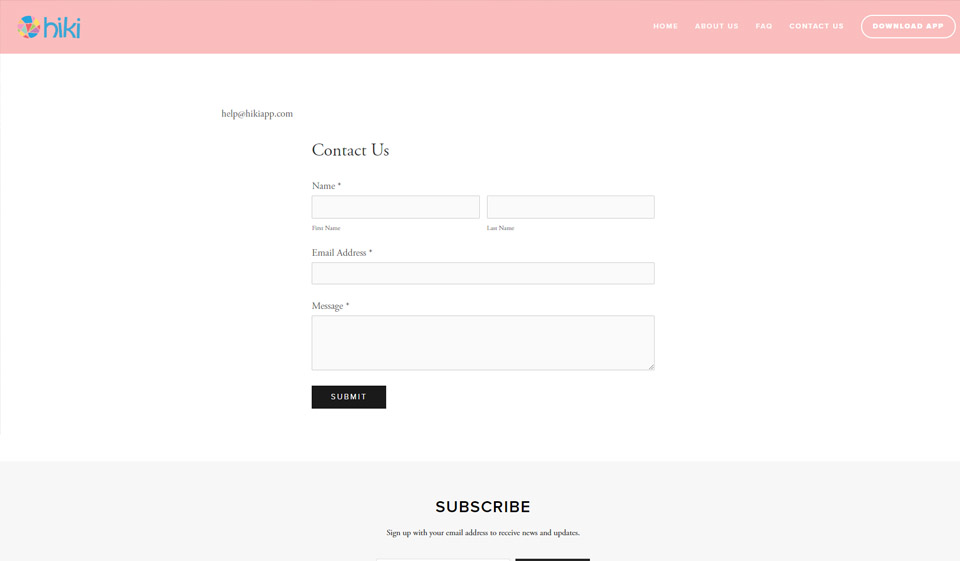
The history of Hiki started in 2019. The app is currently new to the market and still gains its audience. Nevertheless, there are already many reviews from the users, and they help better understand what kind of an app Hiki is. The latest update of the application appeared in the App Store and Play market on the 8th of May, 2020.
Who Owns Hiki?
The founder and CEO of Hiki are Jamil Karriem. The problems of people of the autistic spectrum have always followed his personal life closely. Jamil’s cousin has autism, and it had been a serious issue for their family. One day, the young man decided to create a platform that would meet people’s requirements and help his cousin get in touch with new people. This way, Jamil opened unknown boundaries of dating when you have autism. That niche was free at that time, and to this day, no other apps like Hiki appeared on the global dating market.
People with autism participated in developing the app and supervised the whole process. Hiki adjusted to their needs and aimed to make the service understandable and clear. Experienced developers who have been working on platforms for disabled and niche dating sites took part in creating Hiki.
Registration & Profile
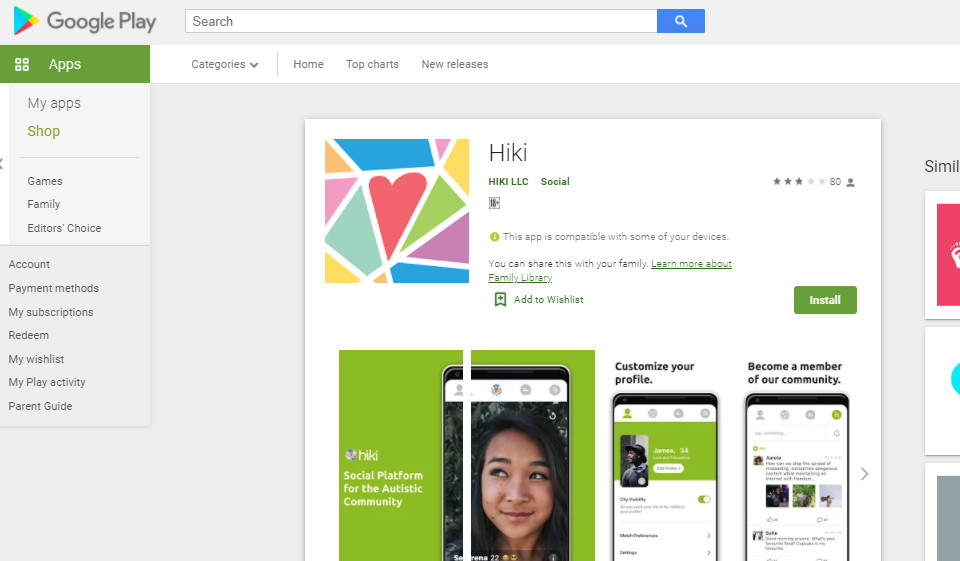
Autism is a disorder that affects the development of the brain. It is characterized by a congenital and all-encompassing deficiency of social interaction and communication that doctors cannot fully cure. Still, autistic people can eventually adjust their symptoms taking medicine and adapt to social life. Hiki took these characteristics into account and created a friendly platform for autistic individuals to join.
The registration starts by entering your mobile phone or linking the account to the Facebook profile. Hiki will receive access to your name and email. For this reason, you do not have to state a nickname. To change the username later, go to the profile settings after registration. All steps are obligatory, and you cannot skip them.
After you decided on the verification method, you should enter your age, and upload a photo. Hiki hints that you cannot proceed without a profile picture, so you must at least take one with the app’s built-in camera or use a photo from your camera roll. If you wish, you can choose an image from Facebook. The next stage is specifying your identity: male, female, or non-binary.
All users have to choose their goal on the platform too. There are three options to answer the “What are you looking for?” question: friendship, love, or both. Next, Hiki asks you to provide your sexual orientation details: do you look for people of the opposite gender or anyone?
Further registration includes filling out a little quiz to personalize the profile description. Here you will need to:
- Pick the emojis that best describe you among six options (you can choose more than one);
- Describe your interests in a free form (the number of signs you have is 350);
- Answer what your favorite stimuli are (up to 350 signs as well);
- Tell what do you want to learn (no more than 350 signs);
- Add more details about yourself (350 signs to describe your favorite food, books, what music do you listen, and anything you would like other people to know).
After the questionnaire, Hiki asks you for permission to be shown your location, and you can proceed to swipe. The first page that opens before you is the feed containing user photos. You should choose the cross sign to skip on a person, the emoji icon to mark that you are willing to be friends with them or the heart sign to show sympathy.
Communication/Matches
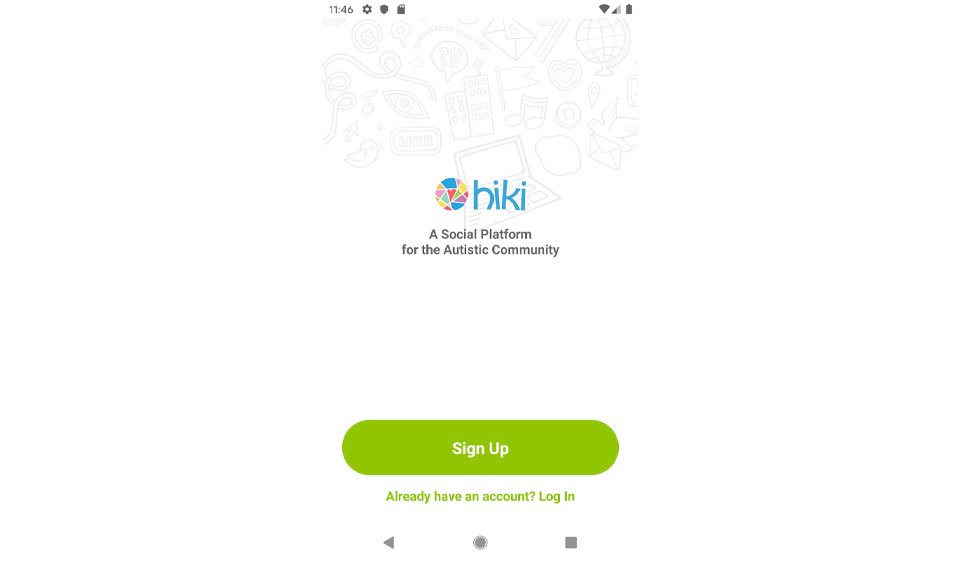
Autists show a lack of desire to build emotional contact with people. First of all — with relatives. Such people do not look people in the eye, do not reach out to their parents, do not smile, and often resist making contact. They do not distinguish relatives and friends from strangers, do not notice that someone is addressing them. That is why online dating would be a good option for them. The founders of Hiki understood that and created a unique atmosphere inside the app.
Besides, a person with autism experiences severe discomfort among other people, and over time anxiety. They do not always participate in discussions, do not understand other people’s emotions, and therefore prefer solitude, which protects them from strong feelings about communication difficulties. For this reason, Hiki was created not only as a platform to make friends but to enjoy private browsing when no one bothers you. Members of the community can hide their activity because the users do not get notifications who liked or visited them. As a result, autism spectrum people do not have to worry that the system will reveal their actions. There is no place for pressure or negativity on Hiki.
The audience of Hiki does not exceed a few thousand users. That is why communication quality and matching results leave a lot to be desired. The autistic spectrum users who created their accounts on this app can only hope that more people will join the community, bringing about changes. Meantime, they can try to reach out to members and step out of their comfort zone by making contact with people all over the world.
How to Search for People on Hiki?
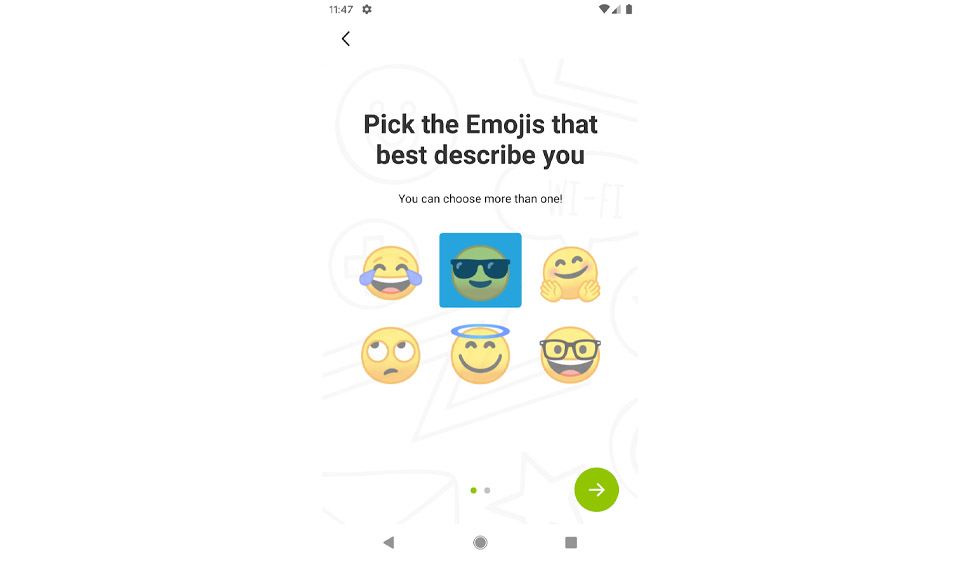
The only criteria for the search on Hiki are:
- Goals of communication (friendship, love, or both) that you stated upon registration;
- The preferable gender of potential partners;
- You gender identification;
- Age preferences;
- Distance.
The huge drawback is the rough estimation of matches. It is not clear how the algorithm behind it works. For example, there are just three age categories available on Hiki: “18-35,” “36-55,” and “56+.” And the distance range varies from “100-150 miles” to “250+ miles.” Such division is also inconvenient for people and makes it impossible to meet someone within easy reach. While the concept behind the app is sweet, the search efficiency seems low and leaves room for improvement.
How to Delete Hiki Account?
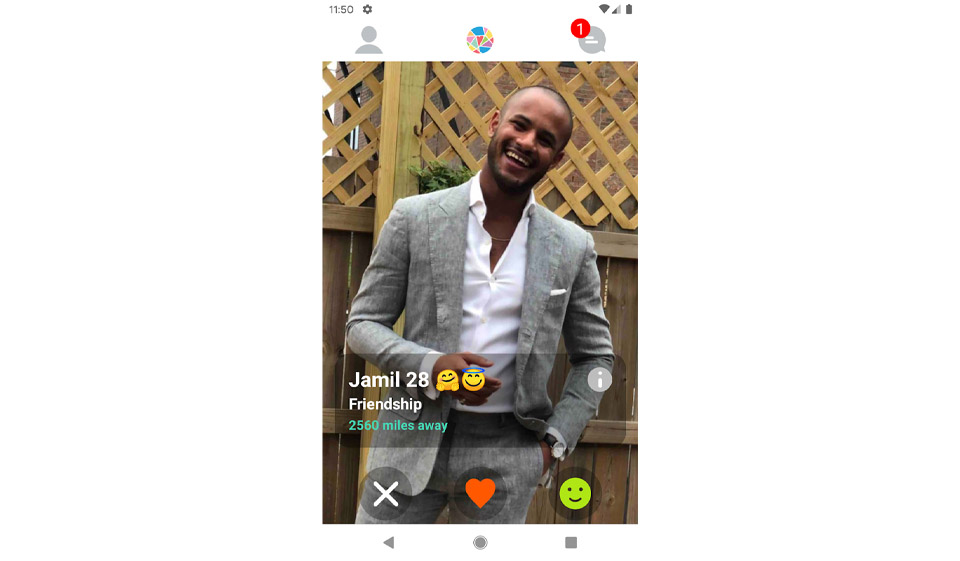
To remove your profile from the Hiki platform, go to the “Settings” part, and you will see the big button saying “Delete Account” on the bottom of the page. After you click on it, the app will ask you to provide the reason for account deletion:
- “I found my partner”;
- “Not enough people near me”;
- “Online dating not for me”;
- “Other.”
Choose one option and confirm the final step.
Members Structure
The WHO estimates that 1 in 160 children has any of the autism spectrum disorders. The American Autism Speaks Association notes 1 case of autism in 88 children. In total, there are 2 million 400 thousand such people in the world. The biggest problem of dating with autism is the negative feedback of the society, which is unaware of the origin and peculiarities of this mental disability. Many people seem concerned about the topic and show prejudice towards autistic people. The concept of Hiki says that anyone is welcome to create the profile on the platform even if you do not suffer from this disorder.
Hiki does not reveal the men to women to other genders ratio of its audience. You will not find the concrete number of how many users are there on the app. You can say nothing about the members’ structure in this regard.
Sexual Preferences
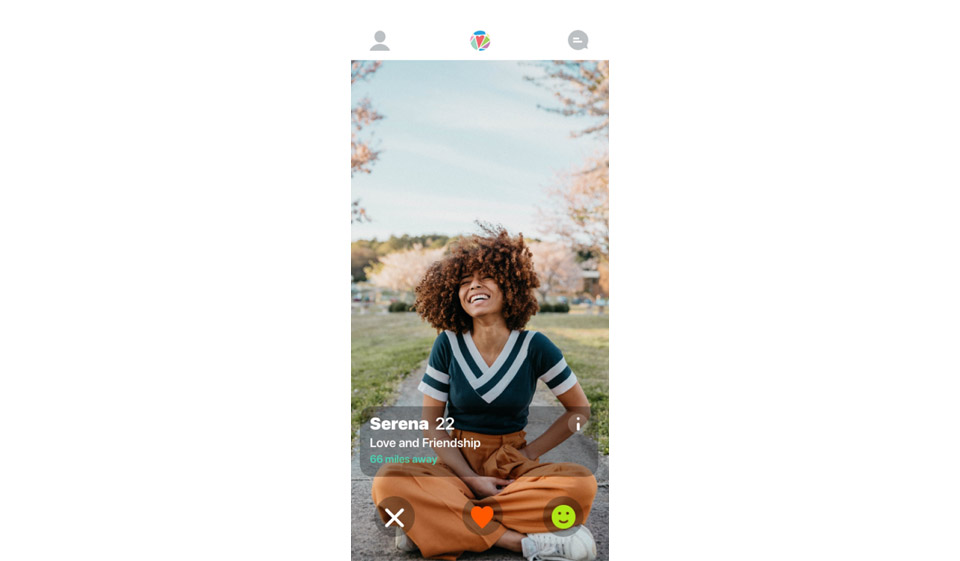
All people over 18 can register on the platform. They may state any gender of the potential match, which means Hiki is tolerant of LGBT people. The range of goals people pursue on the app is not ample: you should choose between friendship, love, or both. Hiki is not suitable for seeking hookups or occasional dating. However, while browsing, you may run across profiles of people with pretty vulgar avatars who are most probably looking for close intimate relationships.
Race and Ethnicity
Hiki is an app for mainly US residents. The majority of its overall insignificant audience is from the USA. The chances to meet someone within easy reach if you are not from America are quite slim.
Religious Orientation
The religious preferences of Hiki users are unclear. There aren’t any questions about faith and beliefs during the registration. The app is open for people of all confession. However, if you seek religious dating, this social platform is not your choice.
Pricing Policies
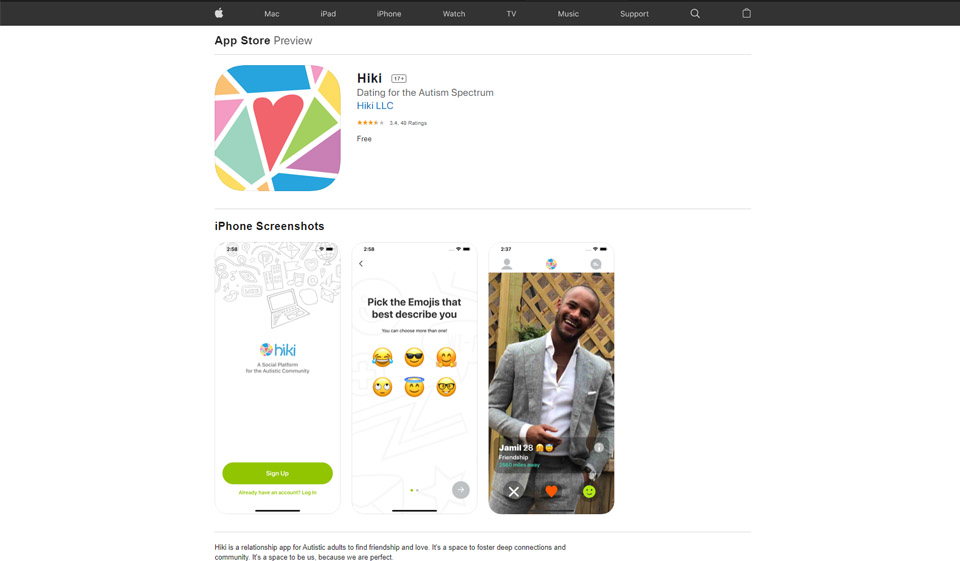
Hiki is an entirely free app for people of the autistic spectrum. It is non-commercial and doesn’t obtain any profit from its users. There are no ads inside the application.
Membership Price
All members can use the full functionality of Hiki for free. These services include:
- Downloading the app;
- Profile creation;
- Further editing of your account;
- Answering the registration quiz;
- Access to the main feed with photos of users;
- Ability to like or skip on people;
- Basic search filters;
- Instant messenger and unlimited conversations;
- “Feed Posts” section;
- Reading detailed information of users in the profile description.
How to Cancel Hiki Paid Subscription?
There is no subscription to Hiki. You can install the app, create an account, and use it free of charge.
Is Hiki Safe?
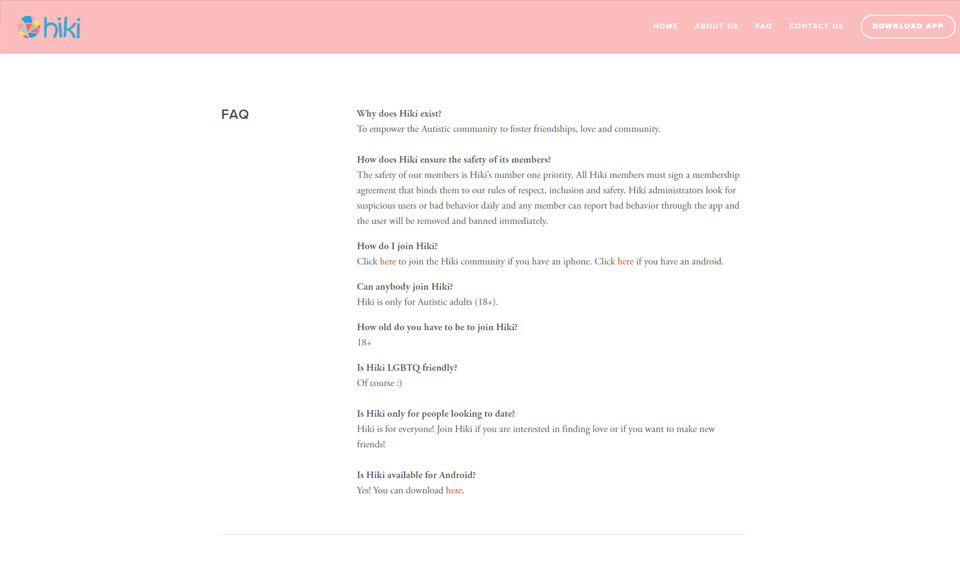
Safety is one of the essential issues for Hiki. It all starts with the profile photo. You should upload the image to create the account, and the moderators verify it later. Otherwise, you cannot access the communication. Some users choose to upload pictures of their pets or stock pictures from the Internet. The resource team doesn’t block such profiles and respects the privacy of people with autistic disorder.
The final step of the registration is reading the terms and conditions of use. These statements warn the users about the hazards of online dating, remind them that they should stay safe, and offer everyone responsibility in both online and offline choices. Hiki knows how hard it can be for autistic people to show their faces, make contact, and do the first step. And the individual characteristics of these people lie in the foundation of the app’s safety policy.
Signing the user agreement means any user of Hiki is aware of the consequences of the violations. In case any person on the platform continuously expresses opinions that offend other members of the app, the moderators will remove such a user forever from the service. Anyone can take part in daily guarding the community and report violations to block the negative figures.
Quality of Profiles
This mental disability is one of the most widely-spread in the world. If you get anxious at hearing this diagnosis or consider it a serious obstacle to building relationships, you are mistaken. The mission of Hiki is to show everyone there is nothing scary in this disorder. The fast-growing community of people with an autism spectrum inspired the creation of this resource.
The matching principle is unclear on Hiki. Of course, everything inside the app works to ensure comfortable and easy use for all people. But this results in a primitive matching algorithm that does not show efficiency. Users define the quality of their feed almost manually. You should choose the age range, gender, and location spectrum of people you will see in your feed. Then the app shows you all people who suit the criteria at least remotely.
Even after specifying your interests and answering the registration questions, you do not get a better quality of matches. Hiki does not recognize the text written in the bio sections. The details there help users to get to know more about the person. Unfortunately, the keywords you state in your description do no help the search. As a result, you get a lot of empty profiles without any information in your feed. Most of the accounts you get do not contain real photos or belong to people who live more than 250 miles away.
Website Design and Usability
This social platform does not have a site. The webpage you can find on the Internet contains the presentation of Hiki’s goals, policies, and the buttons to direct you to the store so that you download the app. After downloading the mobile application suitable for your device’s software, you can create the account.
There are four sections inside the app which correspond to the main functions:
- Profile;
- User Feed;
- Messaging;
- Post Feed.
Inside the first one, you can edit or delete your profile, adjust the personal parameters, or search preferences. The next one shows you all Hiki users, which suit your criteria. In this section, you should swipe to receive matches with people.
Conversations appear in the third section when you get a match. When your interest in another person coincided with their action on your profile (you both chose you to want to be friends or build love relationship together), the chat opens, and you can freely communicate. Hiki does not allow you to message any person unless you have liked each other.
The last section is the forum for discussions of all users. It reminds Twitter that any people, regardless of their location and correspondence to your requirements, can publish posts. Users can tell what’s on their minds, add photos, and write comments in response to other people’s posts.
How Does Hiki Work?
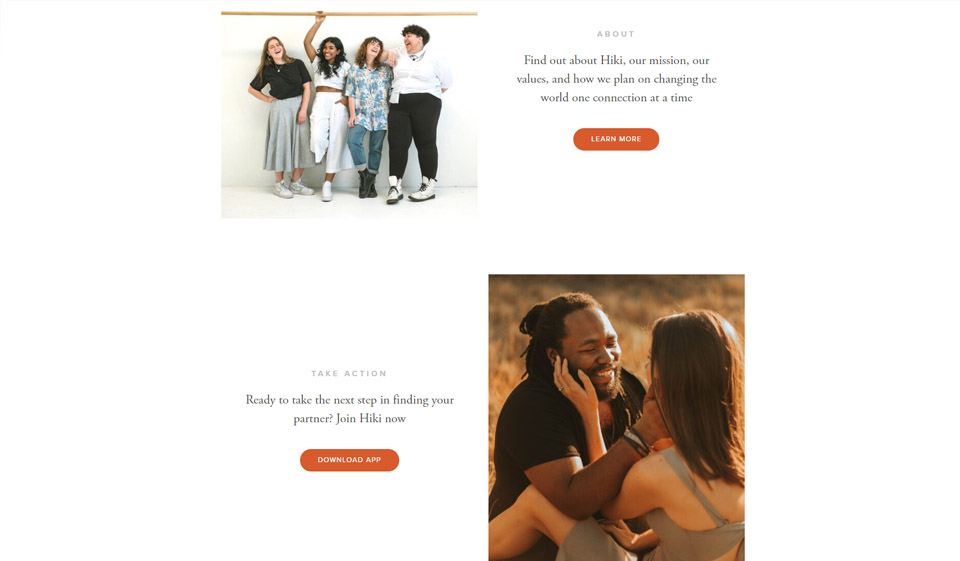
People who used the app stated that they go more matches than they got on Bumble or Tinder combined. However, the principle behind the matching is not quite understandable. Hiki users have to set the search criteria and can swipe people similar to Tinder. But the matches they get are often inappropriate and do not meet their requirements. Unfortunately, the app often shows users who live far away, and you can only communicate with them online. On Hiki, it is easy to make online-friendship or talk to people when you feel bored. But its convenience for long-term relationships is questionable. The matching algorithm seems to work insufficiently.
In general, the reviews about the app’s work are mainly negative. Regardless of its noble aim and friendly community, Hiki is not a useful dating app. People of the autistic spectrum can use it to find a few lonely users who deal with the same disorder as theirs. But the matches show people far away from you, the response rate is miserably low, and the search filters are rough. It seems that this app is only starting its career and has not yet figured out how to work correctly.
Hiki App
Nothing bad can be said about the interface of the app. It copes with its primary function to the fullest. You have the most straightforward design possible, which would suit people of the autistic spectrum. The central color of Hiki os green, the buttons are big, and the menu is simple.
The application is free to download on Android and iOS. If you want to use Hiki, you must install it because only this way can you create the account. The overall rating of the app varies from 2 to 3 stars. The poor matching and small audience explain such feedback. If you do not look at its effectiveness, the app’s interface is modern and reminds that of the coolest dating services.
Alternatives of Hiki
There are currently no alternatives to this autistic-oriented dating service. Hiki is the pioneer in this niche. But some apps may help you find your soulmate regardless of your peculiar disorder.
- OkCupid is the global dating service aiming at connecting people of all ages, nationalities, temperaments, goals, and characteristics.
- Tinder is another mobile app whose design resembles Hiki. Even if you have never tested an authentic dating service before, Tinder will be easy to operate for you.
Conclusion
Considered all its drawbacks, Hiki is still a good app. It offers autistic people a unique environment to communicate. Hopefully, one day its audience will grow, and more people will enjoy the friendly interface and simple operation of its service. Hiki is now suitable for one purpose: helping people with autism gradually open up.
Contact Information
Company: Hiki, Inc
Email: [email protected]


Recommended websites
Please send us an email at [email protected] with any queries you may have. You can locate the most reliable free hookup sites by using our suggestions; Not to mention your ideal dates and hookups. We can also assist you in selecting hookup platforms that offer great value for your money and a high likelihood of success. If you follow our advice, you avoid being duped by rogue dating sites.
Best Hookup Websites earn in a variety of ways, including affiliate marketing. Even though we get compensated for link placement, we always provide our honest opinion and never advocate anything detrimental to our users since client trust is our top concern. We always prioritize quality above quantity and undertake extensive research before making a recommendation.
See Advertiser Disclosure for further information.
The information on this page was last updated on September 14th, 2026.








